Each of the champions has a unique story to tell.
GLOBAL WINNERS
BEST SUPPLY CHAIN FINANCE PROVIDER (BANK)
Standard Chartered
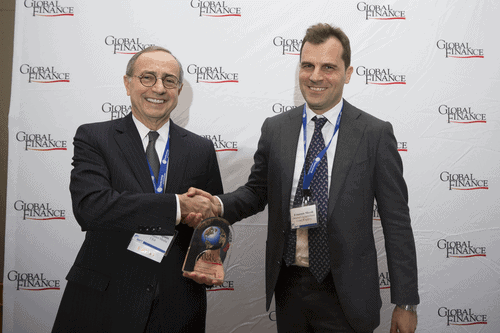
With its “banking the ecosystem” approach, Standard Chartered stands out from other providers who typically bank only large creditworthy buyers and do not bank the lower-tier suppliers, vendors and distributors that are more in need of affordable working capital. Standard Chartered connects buyers, suppliers and the companies they do business with, by integrating “financial, informational and physical flows” and leveraging the capabilities of its corporate and institutional as well as commercial and business banking units. Standard Chartered’s supplier-finance solutions encompass receivables, vendor prepay, payables financing and preshipment finance.
BEST SUPPLY CHAIN FINANCE PROVIDER (NON-BANK)
Orbian

In an area that is undergoing rapid change due to new entrants and incumbents leveraging technologies such as blockchain and distributed ledger, Orbian is one of the longest established players in supply chain finance (SCF), with more than 15 years’ experience in providing multibank SCF solutions. Orbian’s platform allows companies to finance their supply chain by issuing notes to sell their receivables to banks. Its multibank funding model appeals to a growing number of companies that don’t want to rely on a single bank or want to be able to easily add and change funding providers, depending on their needs. Clients praise Orbian for its ease of enrollment, which is important for any SCF program in terms of supplier uptake.
BEST CUSTOMER IMPLEMENTATION
MUFG Public-Private Partnership Supplier Financing/Waskita Karya

Previous winners of this category have typically been American or European banks. But MUFG’s SCF program for Waskita Karya (Waskita), the largest state-controlled company in Indonesia, stands out for more than the fact that it was orchestrated by a Japanese bank. Waskita plays an integral role in infrastructure development in Indonesia and wanted a quicker way to provide short-term working capital for its suppliers. Paying suppliers earlier is not in itself unique, but the ripple effect it had in terms of enabling Waskita to enjoy uninterrupted supply of raw materials has important implications for infrastructure development in Indonesia. To aid supplier enrollment, MUFG provided simulated examples based on their annual supplies to Waskita and a comparison of costs between bank credit facilities and MUFG’s SCF solution, which may explain why MUFG was able to enroll approximately 100 suppliers in a short time.
BEST PLATFORM CONNECTING BUYERS/SELLERS/FINANCIAL INSTITUTIONS
Orbian
The SCF provider’s multibank platform serves more than 7,000 clients in approximately 80 countries. Orbian partners with international and local banks to provide funding to its SCF customers. According to Orbian, in the last 12 months, it issued $27 billion in financing notes and transacted $31 billion in supplier payments. Customers praise the flexibility the platform affords them by its ability to source funding from multiple banks. Supplier onboarding and enrollment is also streamlined to ensure that suppliers can get up and running quickly.
BEST E-PROCUREMENT
SAP Ariba
Ariba was founded in Menlo Park, California, in the midst of the dot-com boom of the 1990s. It is now part of German enterprise-application software giant SAP, offering Cloud-based solutions that cover the entire source-to-settle process, enabling buyers and suppliers from more than two million businesses and 190 countries to source goods. According to Apps That Run The World’s Top 10 Procurement Software Vendors and Market Forecast 2016–2021, SAP led in 2016 with a market share of 23% and more than $1.1 billion in procurement product revenues. In 2017, SAP Ariba formed a strategic alliance with IBM to deliver “cognitive procurement solutions that redefine the source-to-settle process,” according to the company. The solutions leverage the latest technologies from IBM Watson cognitive computing and SAP Leonardo (a digital innovation system), to bring greater intelligence and predictive insight to procurement.
BEST ANALYTICS FOR CREDIT SCORING/SUPPLIER RISK ASSESSMENT

Dun & Bradstreet
Analysis provided by Dun & Bradstreet enables companies to more accurately assess risks that could impact their global supply chains. Everything from updates on the latest trade negotiations and cyberattacks to Brexit negotiations and fluctuations in commodity prices is featured in D&B’s global supply-chain risk analysis. Supply-chain risks are broken down by country and region. D&B data also enable companies to more easily select suppliers that comply with diversity requirements and more readily identify those that are on international watch lists.

BEST INVOICE DISCOUNT MANAGEMENT
Basware
Finnish invoice automation specialist Basware leverages invoice data captured on its Basware Commerce Network to develop value-added services. While setting up a traditional SCF program can take weeks or months, discounting invoices is as easy as accessing an app on the Basware Network. Automating paper-based invoices enables suppliers to more easily offer discounts on invoices for early payment by suppliers.

BEST INTEGRATED TRADE, CASH AND SUPPLY CHAIN MANAGEMENT
Citi
SCF is integrated within Citi’s Treasury and Trade Solutions business line, which encompasses cash management, payments, receivables, liquidity and investment, working-capital solutions, commercial and prepaid cards, trade and supply chain finance, and export and agency financing. The bank’s supplier-finance platform is also integrated with cash-management capabilities such as global cross-currency payments.
BEST WEB-BASED SCF SOLUTION
GT Nexus
Now part of enterprise software company Infor, GT Nexus leverages the benefits of the Cloud to provide a “global view” of the more than 100,000 users, 55,000 businesses, 32,000 suppliers and factories and 40+ financial institutions that use its collaborative platform. It purports to be the largest supply chain platform in the Cloud, fusing the physical and financial supply chains. The visibility of trade flows on its platform enables GT Nexus to provide “events-triggered financing” and “data-driven funding decisions,” so financing can be more readily extended to lower-tier suppliers.
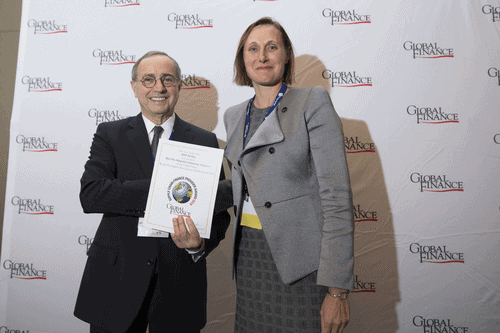
BEST PRESHIPMENT FINANCING SOLUTION
BNP Paribas
The French bank’s 100%-owned Dublin subsidiary, Utexam, buys, holds and sells a variety of inventories for customers of BNP Paribas. It is one of the few banks in trade and SCF to boast such a specialized subsidiary, which buys companies’ finished and semifinished goods or raw materials when market pricing is more attractive or if they want to buy in bulk to achieve greater economies of scale. Inventory is purchased by Utexam and then sold back to the client on a “just-in-time” basis. Inventory can be stored by Utexam or at a third-party location.
REGIONAL WINNERS
NORTH AMERICA
Citi
Citi continues to invest in its proprietary supplier-finance platform. Recent enhancements it has made to the platform include streamlining the supplier-onboarding process. Its supplier-finance programs have been running for more than 15 years. In North America, its programs encompass a wide range of industries including retail, aerospace, pharmaceuticals and food services. It has developed mobile applications for alerting suppliers about payments and invoice discount requests.

LATIN AMERICA
Santander
The Spanish bank has offered confirming, or SCF programs based on reverse factoring (approved payables), for more than 20 years in the region. It recently developed an international confirming platform to service international clients. Santander has won confirming deals spanning 19 countries. To accept receivables from customers located all over the world, Santander has developed a model for analyzing the behavior of a portfolio of assets more predictive than previously. The bank says this has resulted in shorter response times, enabling it to be more agile than its competitors.
CARIBBEAN
Citi
Cash shortages, political and uneconomic uncertainty and supply chain risks are forcing companies in the region to look more closely at better managing their working capital. Citi has unrivaled coverage in the region; and customers benefit from its investment in a globally consistent platform based on the CitiDirect BE online portal, which provides access to a wide range of treasury and trade solutions. Professionals are also on hand to help onboard suppliers to ensure the success of SCF programs.
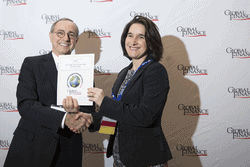
WESTERN EUROPE
BBVA
Spain is one of the most developed markets for SCF, having pioneered confirming, or reverse factoring, more than 20 years ago. In Europe, Spanish bank BBVA says it can service client buyers anywhere in Europe. Payments can be made in more than 20 currencies, and suppliers do not need to open an account with BBVA. The bank’s proprietary SCF platform provides real-time updates on invoices and allows suppliers to simulate the impact on their business of discounting invoices to get paid earlier.

NORDIC COUNTRIES
Nordea
Nordea is not only a major Nordic bank, but also a major player in Western Europe. It boasts a trade and working-capital management team, which takes an advisory approach to helping companies better understand their business processes and areas that can be improved. With a strong digital focus, Nordea is developing proofs of concept for the use of distributed-ledger technology, as well as implementing solutions such as dynamic discounting, which means suppliers can get paid earlier by offering buyers a discount on invoices.
CENTRAL & EASTERN EUROPE
UniCredit
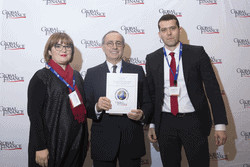
UniCredit boasts a leading market share in terms of total assets in most of the markets in which it operates across the region. With a direct presence in Bosnia and Herzegovina, Bulgaria, Croatia, Czech Republic, Hungary, Romania, Russia, Serbia, Slovakia, Slovenia and Turkey, UniCredit is well placed to serve the SCF needs of businesses that operate in the region and in Western Europe. It offers a wide range of SCF services including payables and receivables finance, dynamic discounting and factoring. Its dynamic discounting solution is offered in partnership with a fintech company. For funding flexibility, the bank also provides structured working-capital solutions, such as selling receivables portfolios to a special-purpose vehicle.

ASIA-PACIFIC
DBS Bank
DBS offers SCF across Singapore, India, Indonesia, China, Hong Kong and Taiwan. SCF forms part of DBS’s open-account trade-finance offering. Its IDEAL open account trade online banking module provides customers with a single interface for managing their funding requests and working-capital needs. Its financing solutions span the purchasing of account receivables, buyer and payables finance, at both preshipment and postshipment stages. The bank’s offering targets not just large corporate buyers, but also small to midsize companies.
MIDDLE EAST

SABB
In 2017, SABB expanded its receivables-finance and supply chain proposition to help clients improve their working capital. Its offering includes supply chain vendor financing, pre- and postshipment financing, receivables and supply chain finance and working-capital advisory. “Receivable finance solutions continue to gain momentum and are becoming more and more popular in the MENA [Middle East North Africa] region,” states SABB, “as it bridges the need of sellers to improve their working-capital efficiencies.” As part of the HSBC Group, SABB benefits from the parent company’s international footprint, technology investment and connectivity.
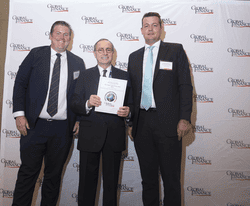
AFRICA
Rand Merchant Bank
RMB has taken a unique approach to rolling out SCF to its customers in Africa. Instead of building a proprietary SCF platform, RMB uses a third-party technology provider, Propell Financial Technologies, which is the African distributor for Cloud-based SCF platform PrimeRevenue. “The Propell offering allows [us] to get best-of-breed technology and allows the client maximum flexibility,” says RMB. With SCF still a relatively nascent offering in the region, RMB says it has successfully implemented two SCF programs, with a further six in the pipeline. With the help of Propell, the bank says it can get programs up and running in less than 30 days.
For the full rankings, click here.



